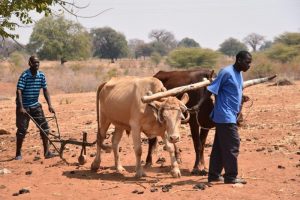Agricultural Education and Innovation in Developing Countries
Submitted by: Rachel Kehoe, Northwestern Ontario Regional Communication Coordinator
Education and innovation in agriculture is essential to creating a long-term sustainable food supply in local communities of developing nations. Through education, support and supplies, the goal to end world hunger comes into view. Canada assists through various organizations and projects, such as Canadian Food Grains Bank and COMMIT (Canadian Outreach Medical and Mission Team), to bring relevant agriculture practices to third-world countries.
Founded in 1983, the Canadian Food Grains Bank has grown from a small group of producers wanting to share their abundance with impoverished communities facing hunger, to a partnership of 15 Canadian churches and church-based agencies working with over 100 partners internationally to bring emergency food assistance and long-term development support to over 30 developing countries. The main objectives of the organization are emergency food assistance, and long-term development.
The emergency food and nutrition assistance provides families with needed support to survive and recover from hardships caused by violent conflict, climate change, political upheaval, natural disasters and economic disruptions. Long-term development work focuses on supporting families’ efforts to provide food for themselves by promoting sustainable farming practices.
Two notable projects are:
1) In the Binga district of Zimbabwe, the focus is on teaching conservation agriculture with mechanization using livestock and special tools which will improve soil health, increase crop production and build the resilience of the agriculture system. This project will benefit 1,500 farmers–approximately 7,000 people. foodgrainsbank.ca/ project/2888/.
2) In Lasta Woreda and Lalibela, Ethiopia, recurrent drought, high population density, cultivation on steep slopes, low plant coverage, overgrazing, and poor land management have contributed to increasing soil erosion. A project is working to alleviate these issues through education and on-site training in sustainable agriculture practices (such as crop and livestock rotation), natural resource management, and beekeeping. This project benefits 690 families–approximately 3,500 people. foodgrainsbank.ca/project/2811/
COMMIT, a charitable organization headed by Dr. Doug Thompson and Janice Rauser, was established after the two spent several years working with communities in Nicaragua. In 2019, COMMIT began the Pilot Agricultural Project in the village of Nandarola. The team worked with the local population to build small scale farms with the intent to create a sustainable food source for families.
The project introduced the use of composter boxes, with the compost enriching the soil, farmers can grow a variety of nutrient dense and high-quality crops to facilitate a healthier diet. Furthermore, the project provided a well and irrigation equipment for the village, so producers can irrigate crops during the countries dry season. The project has since expanded into six villages in Nicaragua and are looking for local assistance to bring the program to an additional village.
Photo credit: foodgrainsbank.ca
The continued development of sustainable agricultural practices and education on a variety of agriculture topics relevant to developing nations ecosystems, climate and unique challenges will greatly impact the citizens ability to grow a long-term sustainable food supply.
Interested in getting involved and helping to end world hunger? commitwithnphnicaragua.simplesite.com or www.foodgrainsbank.ca.
